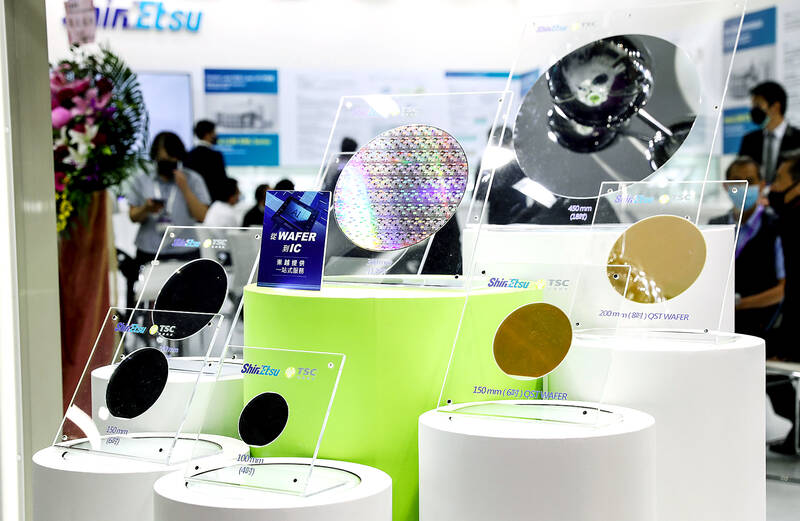The production value of Taiwan’s semiconductor industry would expand 6.1 percent annually to about NT$5 trillion (US$161.5 billion) next year, as demand for advanced chips used in high-performance-computing and artificial intelligence devices are less prone to mounting inflation and external uncertainties, the Industrial Technology Research Institute (ITRI, 工研院) said yesterday.
That means the local semiconductor sector would continue to outstrip the global semiconductor industry, whose output is expected to contract 3.6 percent annually to US$596 billion next year, Gartner Inc has said.
However, ITRI’s latest forecast represents a downgrade from its previous projection of 10 percent growth, as demand for PCs, tablets and smartphones started to wane in the second quarter of this year, leading to excess chip inventory.

Photo: I-Hwa Cheng, AFP
The foundry segment is expected to grow 31.7 percent annually to about NT$2.56 trillion next year, providing the main catalyst for the local semiconductor industry and offsetting an expected decline of 21.5 percent in the memorychip segment, ITRI said.
The chip design segment would be another growth driver, with production value expected to grow 5.1 percent annually to NT$1.3 trillion, fueled mainly by rising demand for 5G, Internet-of-Things, and high-performance computing devices as well as low-orbit satellites, ITRI analyst Nancy Liu (劉美君) said.
A recovery in smartphone demand in the second half of next year could further boost overall growth in chip designers, she said.
“Taiwan has a strong competitive edge, given its quality workforce and the cluster effect from supply chains,” Liu said.
“It is not easy for other countries to duplicate Taiwan’s success in the semiconductor industry, although some are trying to build local chip manufacturing,” she said.
South Korea’s Samsung Electronics Co has taken the lead in the technology race by ramping up production of 3-nanometer chips, the most advanced currently available, six months ahead of Taiwan Semiconductor Manufacturing Co (TSMC, 台積電), Liu said.
However, TSMC is securing more orders, she said.
The company’s 3-nanometer chip has entered mass production this quarter, she added.
Taiwan has built strong chip manufacturing output capabilities and the issue now is how to fend off competition from the other countries, former ITRI president Shih Chin-tay (史欽泰) said.
Taiwan can maintain its strength in the next three to five years, Shih said.
Asked by a reporter whether TSMC’s capacity expansion in the US and Japan would lead to brain-drain, as the chipmaker has sent 300 engineers to its Arizona fab, Shih said the government should devise a long-term industry policy to enhance talent cultivation and invest in developing related applications that require advanced chips.
It is not enough to offer tax incentives as stipulated by a draft bill, Shih said.
Separately, Taiwan’s manufacturing output is expected to grow 3.24 percent annually to NT$26.32 trillion next year, slowing from last year’s 4.76 percent expansion, ITRI said.
The output of information technology sector, the pillar of the local manufacturing sector, is expected to grow 3.38 percent annually to NT$10.59 trillion, also slowing from last year’s 8.58 percent growth.
The researcher attributed the smaller figure to macroeconomic uncertainties, geopolitical tensions and inventory digestion.

TECH CLUSTER: The US company’s new office is in the Shalun Smart Green Energy Science City, a new AI industry base and cybersecurity hub in southern Taiwan US chip designer Advanced Micro Devices Inc (AMD) yesterday launched an office in Tainan’s Gueiren District (歸仁), marking a significant milestone in the development of southern Taiwan’s artificial intelligence (AI) industry, the Tainan City Government said in a statement. AMD Taiwan general manager Vincent Chern (陳民皓) presided over the opening ceremony for the company’s new office at the Shalun Smart Green Energy Science City (沙崙智慧綠能科學城), a new AI industry base and cybersecurity hub in southern Taiwan. Facilities in the new office include an information processing center, and a research and development (R&D) center, the Tainan Economic Development Bureau said. The Ministry

ADVERSARIES: The new list includes 11 entities in China and one in Taiwan, which is a local branch of Chinese cloud computing firm Inspur Group The US added dozens of entities to a trade blacklist on Tuesday, the US Department of Commerce said, in part to disrupt Beijing’s artificial intelligence (AI) and advanced computing capabilities. The action affects 80 entities from countries including China, the United Arab Emirates and Iran, with the commerce department citing their “activities contrary to US national security and foreign policy.” Those added to the “entity list” are restricted from obtaining US items and technologies without government authorization. “We will not allow adversaries to exploit American technology to bolster their own militaries and threaten American lives,” US Secretary of Commerce Howard Lutnick said. The entities

Minister of Finance Chuang Tsui-yun (莊翠雲) yesterday told lawmakers that she “would not speculate,” but a “response plan” has been prepared in case Taiwan is targeted by US President Donald Trump’s reciprocal tariffs, which are to be announced on Wednesday next week. The Trump administration, including US Secretary of the Treasury Scott Bessent, has said that much of the proposed reciprocal tariffs would focus on the 15 countries that have the highest trade surpluses with the US. Bessent has referred to those countries as the “dirty 15,” but has not named them. Last year, Taiwan’s US$73.9 billion trade surplus with the US

The Taipei International Cycle Show (Taipei Cycle) yesterday opened at the Taipei Nangang Exhibition Center, with the event’s organizer expecting a steady recovery in the industry this year following a tough last year. This year, 980 companies from 35 countries are participating in the annual bicycle trade show, showcasing technological breakthroughs and market development trends of the bicycle industry at 3,600 booths, the Taiwan External Trade Development Council (TAITRA, 外貿協會) said in a statement. Under the theme “Ride the Revolution,” the exhibition has attracted more than 3,500 international buyers from 80 countries to preregister for the four-day event, which is expected to